Can a Rebrand Quell the Sustainable Apparel Coalition’s Critics?
- Oops!Something went wrong.Please try again later.
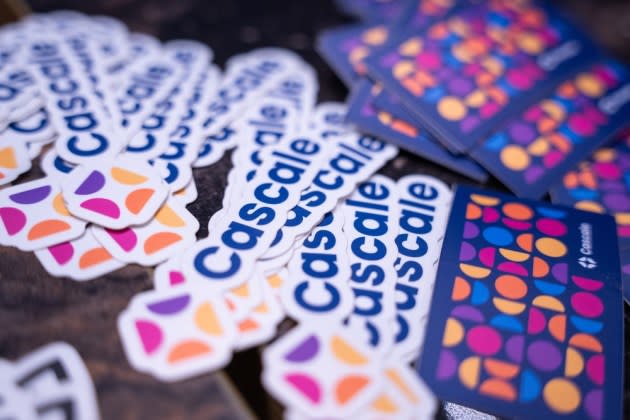
It was perhaps only fitting that the Sustainable Apparel Coalition chose London as the site of its radical rebrand last Tuesday. It was here in 899, after all, that the West Saxon king Alfred the Great founded the settlement of Lundenwic, some 400 years after the Romans abandoned their defensive enclosure of Londinium and several thousand since Neolithic man hunted and gathered in its unnamed wilds. Over the next millennium, the city continued to reinvent itself, becoming the beating political, financial and trading heart of the world’s foremost empire. Even in its diminished post-colonial aftermath, London continues to transform, its assemblage of stately brick manses, crumbling stone docks and towering steel edifices rising above the bones and shards of permutations past.
The real reason the newly christened Cascale held its celebratory event at Searcys at the Gherkin, itself formerly known as 30 St Mary Axe and, before that, the Swiss Re Building, is probably more prosaic. Most of the brand, retail and manufacturer representatives it wanted to hobnob with over speeches, rotating canapés and creative cocktails with names like Cascale 24 and A New Era were already in the general vicinity following the European fashion weeks and the OECD Forum on Due Diligence in the Garment and Footwear Sector in Paris.
More from Sourcing Journal
In the end, roughly 130 made it to the 39th floor of the so-called “glass pickle,” where everyone, staffers included, had to get used to wrapping their tongues around the new moniker. There was a swear box for those who used the old name, attendees were warned. Already, Jeremy Lardeau, vice president of the Higg Index, owed it 20 pounds, or 25 American bucks. “New name, new look, same vision,” one sign proclaimed.
It was time for a change, Andrew Martin, Cascale’s executive vice president, said in an interview a couple of weeks before the shindig. The erstwhile SAC, whose 300-member-strong roster includes Adidas, H&M Group, Zara owner Inditex and The North Face owner VF Corp., is coming up 15 years, but a combination of internal and external forces have led it to “evolve” its strategic plan to move beyond cranking out measurements through its Higg Index suite of tools. Then there was the fact that home furnishings, sporting and outdoor goods, and bag and luggage purveyors have been steadily filling out its ranks. Not only did an “apparel” coalition no longer convey the scope of the organization’s work, Martin said, but the term “sustainable” had become both a meaningless buzzword and something that should be self-evident in any group’s raison d’etre.
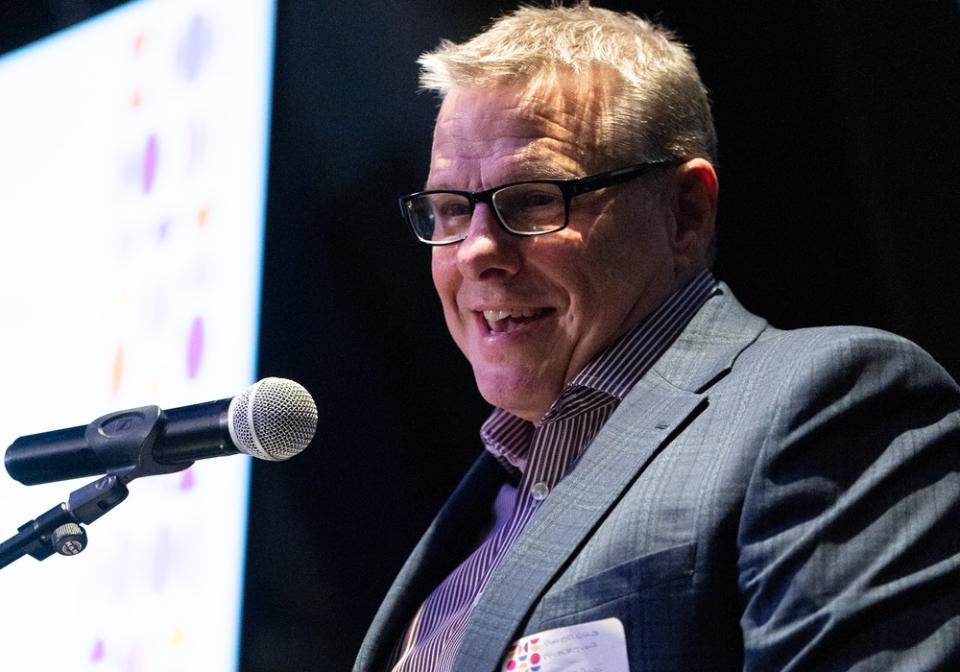
“We wanted to shift to something that is really about how to focus on driving collective action and scale,” he said. “The vision of a consumer goods industry that gives more than it takes to the planet and its people is still the same. However, with a new name, when you look at collective action at scale, the idea of something that’s very energetic, very dynamic really gave us that renewed sense of, ‘Now’s the time to double down,’ build on those tools that we have and move into an era of delivering impact.”
As one of London’s favorite sons once asked, “What’s in a name? That which we call a rose by any other name would smell as sweet.” The response? Quite a lot. The “Cas” in Cascale, as a hand-out helpfully explained, is SAC reversed. “CA” refers to collective action, the “C” evokes the “new phase” of a crescent moon and “scale” represents the desire to, well, scale. Gone is the needle-and-thread logo. In its place is a Tudor-esque rosette of four outward-facing semicircles that represent the organization’s three member categories and external stakeholders. Cascale, pronounced “kæsk eɪl,” is set to only grow from here.
“We have quite a few members who are already doing home furnishings, so we have the opportunity to engage with them, and we got a new home furnishings member last year with Dunelm,” Martin said. “We’re not diluting any resource that we can reinvest in the apparel and footwear sector; that’s really important to us. This is about expanding into those high adjacencies.”
The problem with building on top of an existing structure, however, is that any wobbly foundations still lurk underneath. One of the then-SAC’s bedrocks, the Higg Materials Sustainability Index, or MSI, which rates the environmental impact of materials across categories such as global warming potential, water scarcity, fossil-fuel depletion and chemistry, hasn’t recovered since the battering its reputation endured two years ago over its ability—or more accurately, inability—to substantiate green marketing claims because of unrepresentative and insufficient data. The brouhaha over the Norwegian Consumer Authority’s declaration in 2022 that brands were “breaking the law” when they marketed their wares as environmentally friendly based on Higg MSI data triggered an “urgent” third-party review of the platform’s methodology. The consumer-facing Transparency Program that the likes of H&M touted with pride mere years ago, is now on an indefinite pause and the Higg MSI will likely be employed in tandem with other tools rather than as a stand-alone.
George Harding-Rolls, who was until recently director of policy and advocacy at the sustainability consultancy Eco-Age, said that a new identity doesn’t change his criticism of the organization, particularly around accountability and transparency, which he has found in short supply. At a previous role at the corporate watchdog group Changing Markets Foundation, Harding-Rolls described large, non-mandatory schemes like the SAC as “unambitious, unaccountable compromised talking shops” that enable “sophisticated greenwashing on a vast scale” by presenting the illusion of progress and, in so doing, derailing genuine transformation.
“There’s very little in this jargon-soup announcement that suggests progress on these issues, or that this is anything more than a surface-level rebrand,” he wrote in an email. “The organization which has been used by the fashion industry as a sustainability stamp of approval has had more than its fair share of reputational crises, but it doesn’t seem that this has translated into the deep reform needed to make it a force of integrity in the industry.”
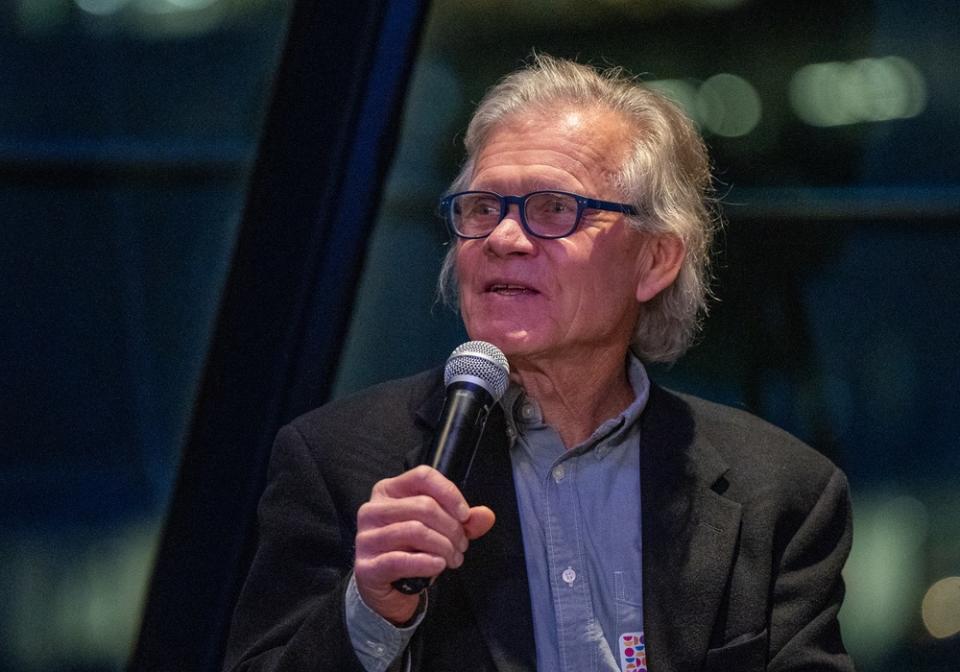
If the SAC has delivered “tremendous impact,” as Rick Ridgeway, the former Patagonia vice president of sustainability and public engagement who co-founded the organization, put it recently, Harding-Rolls isn’t seeing it. Despite abandoning the much condemned single aggregated score, the Higg MSI still rates synthetics as better for the environment than natural ones because of a cradle-to-gate approach that does not take into account fossil fuel extraction, he said. Meanwhile, Harding-Rolls added, the real drivers of the industry’s problems remain woefully unaddressed.
“Look around you: over the past decade ultra-fast fashion has taken overproduction and overconsumption to giddying heights, false solution after false solution has been debunked, 99 percent of fashion is still rigidly linear and hooked on fossil fuels, even the most promising market-based solutions are faltering due to lack of brand follow-through (see Renewcell), and the greenwashing crackdown has scoured away the industry’s paper-thin green glaze,” he said. “Against this backdrop, a deep and sober assessment of the ongoing utility of voluntary initiatives like Cascale is sorely needed but apparently lacking in this announcement.”
This isn’t the first time a character in the vast SAC cinematic universe has forged a new identity. In May, Higg Co, the technology platform that hosts the Higg Index, rebranded to Worldly. Last month, the Social & Labor Convergence Program spun off from the SAC to become an independent organization, much like Higg Co did in 2019. Similarly, the Apparel Impact Institute was founded by the SAC and its partners in 2017 as a distinct nonprofit collective to “identify, fund and scale proven quality solutions.”
Martin has anticipated the naysayers, saying that “whatever we do, the criticisms will come.” Cascale isn’t some kind of witness protection program to get away from bad press, he noted. The Higg Index—which besides the MSI includes the Facility Environmental Module, the Facility Social & Labor Module and the Brand & Retail Module—isn’t going away but will be reinforced and expanded upon. Cascale will continue the decarbonization program it began in 2022 to drive the adoption of science-based targets. (So far more than 60 percent of its members have done so.) Under the banner of decent work, Casacle will be developing a responsible corporate practices program that will be “very much focused” on better purchasing practices. A circular product design program will likewise be coming down the pike. The SAC’s three pillars—combatting climate change, decent work for all and a “nature-positive” future—will be Cascale’s.
Gary Cook, global climate campaigns director at environmental nonprofit Stand.earth, said he welcomed Cascale’s expansion to other categories facing similar hurdles with reducing greenhouse gas emissions in their supply chains. The “real challenge,” he said, is for Cascale to show that it’s not just bigger but that it’s also more focused on helping its members rein in their carbon footprints. Repeated analyses by the Lululemon nemesis have concluded that its largest members are “far off track” from halving climate pollution by 2030. Beyond positive PR, there are also few, if any, tangible incentives for brands and their suppliers to improve their performance, a circumstance that once led an academic to dub the Higg Index in general and the tool known as the FEM in particular a “scale without a diet.”
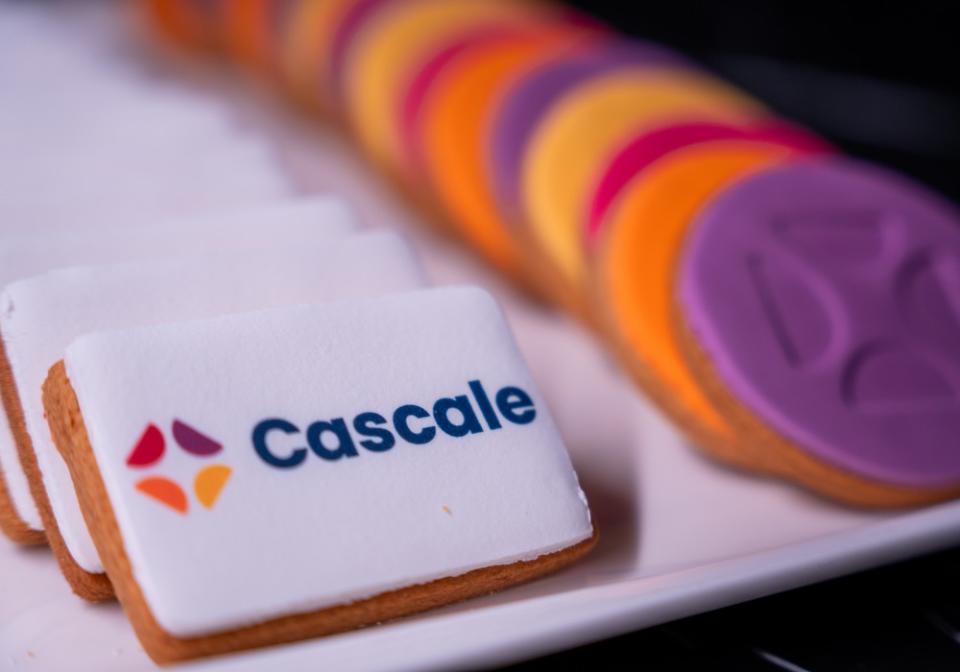
“With just over five years remaining before 2030, we cannot afford to simply be putting old wine in new bottles,” Cook said. “Whoever takes the helm of this new organization hopefully will be given a strong mandate to drive greater transparency and accountability on the decarbonization goals required of its members—and greeted with a greater appetite among its largest members to push for the policy changes in Asia and other supply chain hotspots that will drive real change across the three pillars that are now Cascale’s.”
He added that governments pay the most attention to which company logos are listed at the bottom of a letter, not the coalition logo at the top.
Former CEO Amina Razvi left the organization in December after an eight-year tour of duty. Cascale hasn’t found a replacement yet, Martin said, though it’s “getting to the latter stages of selection.”
Under the reflective multifaceted dome of the Gherkin, Ridgeway recounted the SAC’s origin story, now enshrined into lore as the coming together of the strangest of bedfellows. It was circa 2005 when one of his adventure buddies, Jib Ellison, founder of sustainability consultancy Blu Skye asked for help with one of his clients, Walmart. The big-box Goliath had in development a supply chain scorecard that measured environmental impact, though it was “weak to say the least.” At the same time, the Outdoor Industry Alliance had developed its own tool—a really rigorous one, in fact—but it was only limited to members of the outdoor industry. When Ridgeway met with some Walmart executives a few years later, senior vice president of sourcing Mary Fox asked him if there was anything they could do together.
“And I told her that it was great that they had developed that scorecard, but they needed to be a little bit stronger,” he said. “And once we got some other big brands and retailers to work together and finally develop a really robust tool that everybody could use, that way it would become standardized. And to appeal to what I assumed was their ego, I said, ‘Let’s codename the idea David and Goliath.’”
Walmart agreed with one condition: It would be David and Patagonia would be Goliath.
“One of the first things that we realized was that the coalition needed to be multi-stakeholder heavy—brands and retailers, suppliers, NGOs, universities, government agencies—because if it was just companies, nobody would trust the results,” Ridgeway said. “We decided everybody would have to have an equal voice, that we were going to move fast and we were never going to allow perfection to get in the way of good enough.”
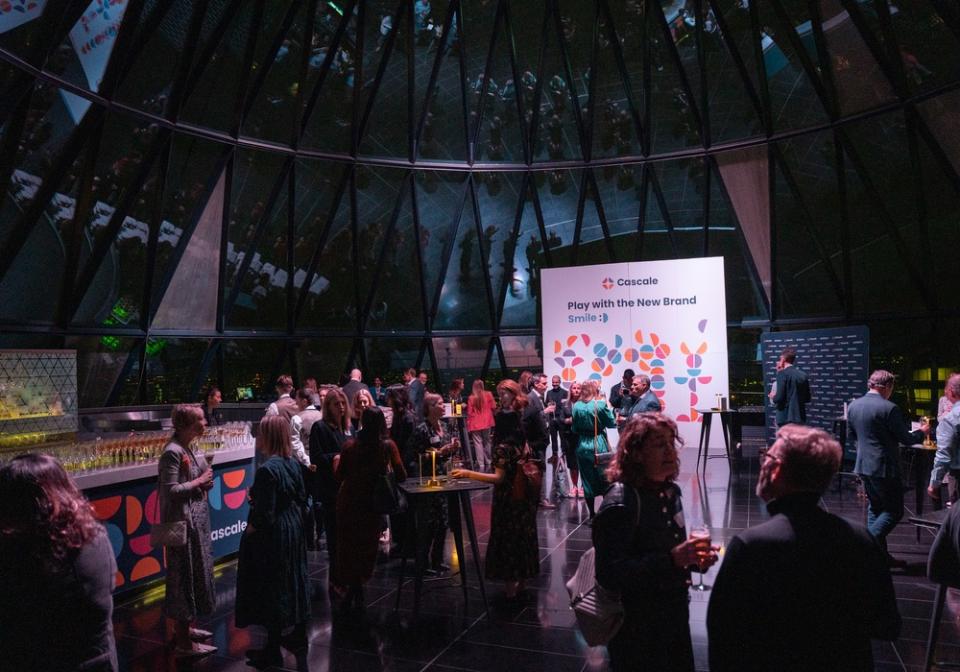
In the windowless basement of an Italian restaurant in Manhattan, Fox came up with the name Sustainable Apparel Coalition and “everybody thought that was O.K.,” he said. A branding firm would be responsible for Higg, named after the at-the-time newly discovered Higgs boson particle that grants almost all other particles their mass. Ridgeway was immediately charmed.
“I said, ‘You know, if the Higgs boson atomic particle’s going to unify the universe, the Higg assessment tool is going to save it,” he said.
Throughout the space, Cascale was impossible to ignore. There was a Cascale backdrop for taking photos. There were Cascale stickers and Cascale cookies, or rather biscuits. Superdry sponsored Cascale-emblazoned hoodies. The logo’s colorful elements were splashed everywhere, from the signs to the stair risers to the front of the bar. It was clear that no expense was spared. One guest wondered out loud if the money could have been used to fund a life-cycle assessment or two that could plug some of the Higg MSI’s data gaps. Another had questions about Scope 3, the indirect emissions that form the bulk of a company’s impact, and the limited visibility of supply chains beyond the initial tiers.
But the occasion at Searcys, with its awe-inspiring view of Tower Bridge and twinkling city lights, was neither the time nor the place for wrestling with difficult subjects. Like the meringue of the miniature sweet cherry pavlovas that closed out the parade of canapes—a reporter, regrettably, polished off five—the atmosphere was fluffy, sweet but ultimately unsubstantial.
Speaking to attendees, Tamar Hoek, senior policy director of sustainable fashion at the civil society group Solidaridad Network and chair of Cascale’s board of directors, described where the industry must now head.
“We have like the tools, we have the data, and now I think we can take the next step toward impact,” she said. “I think the fashion industry has always been seen as a frontrunner in this space of sustainability and I think we have the chance to really materialize that ambition to show that we can create impact while working together.”
Hoek said that she couldn’t think of another platform that includes manufacturers “around the table,” and that Cascale has the “right people” with the important global reach to create the necessary change.
Martin, for one, likes the new name, which he thinks “tells a story.” Plus, the team underpinning Cascale is strong. “If this rebrand does anything, it just helps accelerators to drive greater impact, so I’m excited about it,” he said. “That’s what I want to say.”
Below the huddle of revelers, reaching out from the remains of bygone Britains as the Thames rhythmically lapped its banks, London bided its ghosts and its time.

